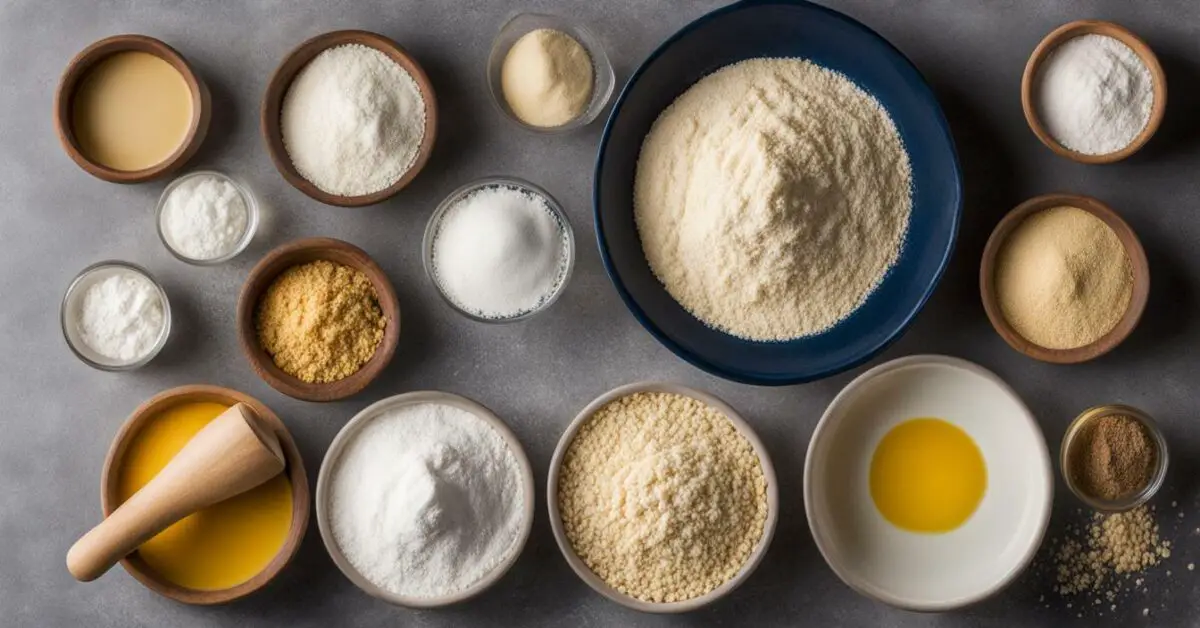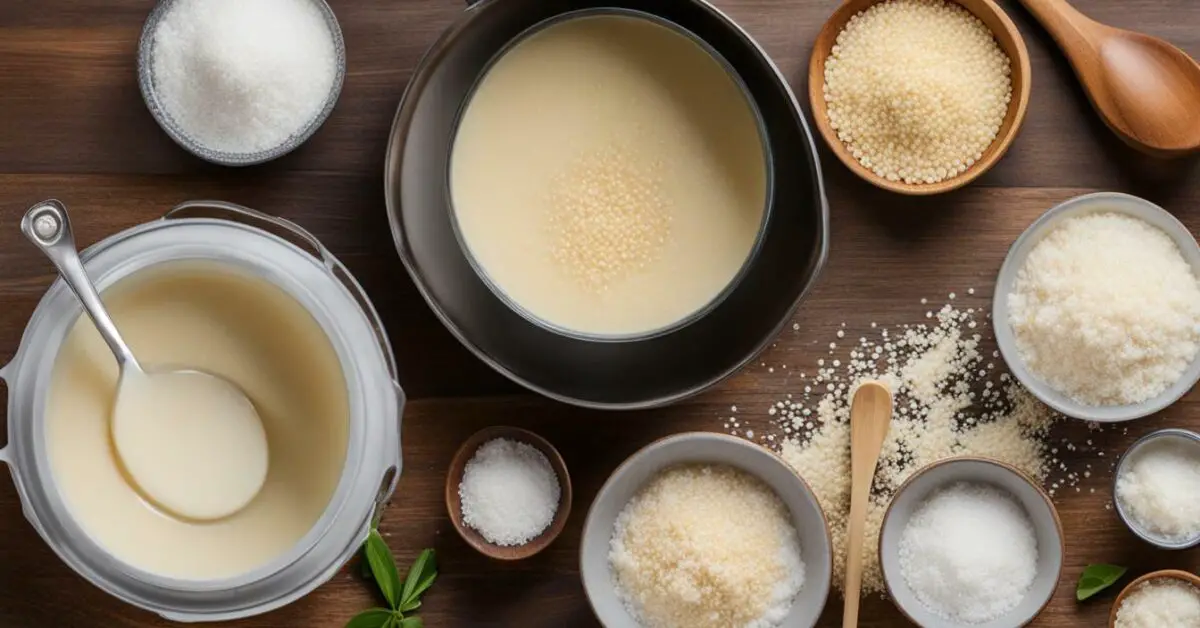
This post may contain affiliate links. Please read my disclosure for more information.
If you’re looking for a substitute for cornstarch in meringue, there are several versatile alternatives you can use to achieve great results. Whether you’re avoiding cornstarch due to dietary restrictions or simply want to experiment with different thickening agents, these options will help you achieve the perfect texture and consistency in your meringue recipes.
Key Takeaways:
- Potato starch is a one-to-one swap for cornstarch and works well in all applications.
- Rice flour can be used as a substitute, but it may be pricier compared to cornstarch.
- All-purpose flour can thicken sauces and gravies, but it won’t provide the same texture as cornstarch in meringue.
- Tapioca flour is a good substitute for puddings and sweet sauces, but use it sparingly to avoid a gummy consistency.
- Arrowroot powder works as a thickening agent but can be more finicky and is not ideal for high heat cooking.
These alternatives to cornstarch in meringue offer different textures and functionalities, so you can choose the best option that suits your needs. Experiment with these substitutes to create delicious meringue desserts without compromising on taste and quality.
Potato Starch
One excellent substitute for cornstarch in meringue is potato starch, which can be used as a one-to-one swap and works well in all applications. Potato starch is a versatile ingredient that adds thickness and stability to meringue without altering the taste or texture.
When using potato starch as a substitute for cornstarch in meringue, simply replace the cornstarch with an equal amount of potato starch in your recipe. The starch will absorb moisture and help thicken the mixture, resulting in a smooth and fluffy meringue.
Whether you’re making a classic meringue pie or a light and airy pavlova, potato starch can be relied upon to deliver excellent results. Its natural binding properties make it an ideal replacement for cornstarch, ensuring that your meringue holds its shape and doesn’t deflate during baking.
| Pros of Potato Starch | Cons of Potato Starch |
|---|---|
| One-to-one swap for cornstarch | May not be readily available in all grocery stores |
| Provides thickness and stability | Slightly more expensive than cornstarch |
| Does not alter taste or texture |
In conclusion, when searching for a substitute for cornstarch in meringue, look no further than potato starch. It offers a seamless transition and delivers the desired thickness and stability without compromising the flavor or texture of your meringue.
Rice Flour as a Substitute for Cornstarch in Meringue
Another option to consider as a substitute for cornstarch in meringue is rice flour, although it is slightly pricier and may have a different texture. Rice flour is made from finely ground rice grains and is commonly used in gluten-free baking. It can be a suitable alternative for those who prefer or require a gluten-free option in their meringue recipes.
Rice flour has a slightly grainier texture compared to cornstarch, which can affect the smoothness of the meringue. However, it still works well in certain applications and can produce a satisfactory result. It is important to note that the texture of meringue made with rice flour may not be as light and airy as when using cornstarch.
To use rice flour as a substitute for cornstarch in meringue, you can follow a simple one-to-one ratio. For example, if your recipe calls for 1 tablespoon of cornstarch, you can substitute it with 1 tablespoon of rice flour. It is recommended to whisk the rice flour with the sugar before adding it to the meringue mixture to ensure even distribution.
| Rice Flour as a Substitute for Cornstarch in Meringue | Pros | Cons |
|---|---|---|
| Gluten-free option | Can be slightly pricier | May have a different texture |
| One-to-one swap with cornstarch | ||
| Simple to use |
In summary, rice flour can be used as a substitute for cornstarch in meringue, providing a gluten-free option for those with dietary restrictions. While it may have a slightly different texture and be slightly pricier, it can still produce satisfactory results when used in the right applications. Remember to use a one-to-one ratio when substituting rice flour for cornstarch and whisk it with the sugar for even distribution. Experiment and enjoy the process of discovering new alternatives for creating delicious meringue without cornstarch.
References
- https://www.thespruceeats.com/substitutes-for-cornstarch-4799986
- https://www.bobsredmill.com/blog/recipes/how-to-use-rice-flour-in-gluten-free-baking/
All-Purpose Flour: A Versatile Substitute for Cornstarch in Meringue
All-purpose flour is a common kitchen staple that can be used as a substitute for cornstarch in meringue to thicken sauces and gravies. While it may not yield the exact same texture as cornstarch, it offers a versatile alternative that can still produce delicious results.
When using all-purpose flour as a substitute in meringue recipes, it’s important to keep in mind that it can affect the final texture. Cornstarch is known for creating a light and airy texture in meringue, while all-purpose flour may result in a slightly denser consistency. However, if you’re primarily looking to thicken sauces or gravies, all-purpose flour is an excellent option.
To use all-purpose flour as a substitute for cornstarch in meringue, simply whisk or sift the flour before adding it to your recipe. It’s important to note that you may need to use slightly more all-purpose flour compared to the amount of cornstarch called for in the recipe. You can start by using a 1:1 ratio and adjust as needed to achieve the desired thickness.
Table: Comparison of Cornstarch and All-Purpose Flour
| Property | Cornstarch | All-Purpose Flour |
|---|---|---|
| Texture | Light and airy | Slightly denser |
| Thickening Power | Very effective | Effective |
| Recommended Usage | Meringue, custards, and fillings | Sauces, gravies, and stews |
| Ratio | 1:1 | May require slightly more |
While all-purpose flour may not provide the exact texture of cornstarch in meringue, it is a readily available alternative that can be used in various other culinary applications. It’s a versatile ingredient that can thicken sauces, gravies, and stews, making it a valuable addition to any kitchen pantry.
Experiment with different ratios and techniques when using all-purpose flour in meringue recipes to find the perfect balance of thickness and texture for your desired dish. Remember that the overall flavor and taste of the meringue should still be delicious, even with the slight difference in texture. Enjoy the versatility and convenience that all-purpose flour brings to your culinary creations!
Tapioca Flour
Tapioca flour is a versatile alternative to cornstarch in meringue, especially in puddings and sweet sauces, although it can become gummy if used in excess. Derived from the cassava root, tapioca flour has a neutral flavor and a fine texture, making it an excellent thickening agent in various recipes.
When using tapioca flour as a substitute for cornstarch in meringue, it’s important to note that it may require slightly more tapioca flour compared to cornstarch. This is because tapioca flour has a lower thickening power, so you might need to adjust the quantity to achieve the desired consistency.
One of the advantages of using tapioca flour is its ability to create a smooth and glossy texture in puddings and sweet sauces. It works well in fruit fillings, custards, and pie fillings, providing a cohesive and creamy result. However, be cautious not to exceed the recommended amount, as using too much tapioca flour can lead to a sticky and rubbery texture.
| Tapioca Flour | Cornstarch |
|---|---|
| Lower thickening power | Higher thickening power |
| Creates smooth and glossy texture | Creates light and fluffy texture |
| Great for puddings and sweet sauces | Ideal for light and airy meringue |
Overall, tapioca flour is a reliable substitute for cornstarch in meringue, especially when used in the right proportions and applications. Experiment with different ratios to find the perfect balance for your recipes, and enjoy the benefits of this versatile alternative.
Arrowroot Powder
Arrowroot powder is another option to consider when substituting cornstarch in meringue. It is a fine white powder that is derived from the rhizomes of the arrowroot plant. Like cornstarch, it acts as a thickening agent and can be used in various culinary applications.
One advantage of arrowroot powder is its ability to create a glossy and smooth texture, making it a popular choice for sauces, desserts, and glazes. However, it is important to note that arrowroot powder can be more finicky than cornstarch and may not hold up as well to heat.
If you decide to use arrowroot powder as a substitute for cornstarch in meringue, it is recommended to use it in combination with other ingredients, such as tapioca starch or rice flour, to enhance its thickening properties. This can help prevent the meringue from becoming too watery or collapsing during the baking process.
| Arrowroot Powder | Cornstarch |
|---|---|
| Derived from the arrowroot plant | Derived from corn |
| Creates a glossy and smooth texture | Creates a smooth texture |
| May not hold up well to heat | Can withstand heat |
| Best used in combination with other thickeners | Can be used on its own |
Overall, arrowroot powder can be a suitable substitute for cornstarch in meringue, but it requires careful attention and experimentation to achieve the desired results. It is recommended to follow specific recipes and instructions when using arrowroot powder to ensure the best outcome in your meringue preparations.
Xanthan Gum: A Versatile Substitute for Cornstarch in Meringue
If you’re looking to thicken sauces and gravies as a substitute for cornstarch in meringue, consider using small amounts of xanthan gum. This natural ingredient, derived from the fermentation of sugars, is a popular choice for individuals with dietary restrictions or those seeking a gluten-free option. Xanthan gum acts as a stabilizer and emulsifier, making it an excellent alternative to cornstarch.
When using xanthan gum in your recipes, it’s important to remember that a little goes a long way. Due to its high thickening power, you only need to use a small amount to achieve the desired consistency. Start with just a pinch or a quarter teaspoon and gradually increase if needed. Too much xanthan gum can result in a slimy or gummy texture, so be cautious with your measurements.
In addition to its thickening properties, xanthan gum also improves the overall texture and shelf life of your meringue. It helps create a smooth and stable mixture, preventing the separation of ingredients and ensuring a velvety finish. Whether you’re making a classic lemon meringue pie or a fluffy meringue topping for your favorite desserts, xanthan gum can deliver the desired results without compromising taste or texture.
| Pros | Cons |
|---|---|
| Gluten-free and suitable for individuals with dietary restrictions | Too much can result in a slimy or gummy texture |
| Improves texture and shelf life of meringue | Requires careful measurement to avoid overpowering the mixture |
| Acts as a stabilizer and emulsifier |
In conclusion, xanthan gum offers a versatile and effective substitute for cornstarch in meringue. Its ability to thicken sauces and gravies, improve texture, and extend the shelf life of your sweet creations makes it a popular choice among home cooks and professional bakers alike. Just remember to use it in moderation and gradually increase the amount as needed. With xanthan gum, you can achieve the perfect consistency and enjoy the same delightful results as if you were using cornstarch.
Conclusion
In conclusion, there are several versatile alternatives to cornstarch in meringue that can be used to achieve great results in your baking endeavors. One option is potato starch, which can be used as a one-to-one swap for cornstarch and works well in all applications.
Another alternative is rice flour, although it may be a bit pricier compared to cornstarch. It can be used to achieve similar results in meringue recipes, providing a slightly different texture and flavor profile.
If you’re looking for a more common household ingredient, all-purpose flour can be used as a substitute. However, it’s important to note that while all-purpose flour can thicken sauces and gravies effectively, it may not give the same light and airy texture as cornstarch when used in meringue.
Tapioca flour is another option that works well in puddings and sweet sauces. However, it’s crucial to use it in moderation as it can become gummy if used excessively.
If you prefer a gluten-free alternative, arrowroot powder can serve as a substitute for cornstarch in meringue. While it functions as a thickening agent, it’s important to be aware that it may not hold up well to heat and can be more finicky to work with.
Lastly, xanthan gum can be used in small amounts to thicken sauces and gravies. It’s a great option for those who need to avoid gluten and want to achieve similar results to cornstarch in meringue.
When experimenting with these alternatives, it’s always a good idea to start with smaller quantities and adjust as needed to achieve the desired consistency and flavor. Whether you choose potato starch, rice flour, all-purpose flour, tapioca flour, arrowroot powder, or xanthan gum, you can achieve excellent results in your meringue recipes without using cornstarch.
FAQ
Can I substitute cornstarch in meringue?
Yes, there are several alternatives you can use to substitute cornstarch in meringue.
What is a good alternative to cornstarch in meringue?
Potato starch is a one-to-one swap for cornstarch and works well in all applications.
Can rice flour be used as a substitute for cornstarch in meringue?
Yes, rice flour can be used as an alternative to cornstarch in meringue, although it is a bit pricier.
Can all-purpose flour be used as a substitute for cornstarch in meringue?
All-purpose flour can thicken sauces and gravies, but it won’t give the same texture as cornstarch in meringue.
What about tapioca flour as a substitute for cornstarch in meringue?
Tapioca flour is a good substitute for puddings and sweet sauces in meringue, but it can become gummy if used in excess.
Can arrowroot powder replace cornstarch in meringue?
Arrowroot powder can work as a thickening agent in meringue, but it is more finicky and may not hold up well to heat.
Is xanthan gum a suitable substitute for cornstarch in meringue?
Yes, small amounts of xanthan gum can be used to thicken sauces and gravies in meringue.


